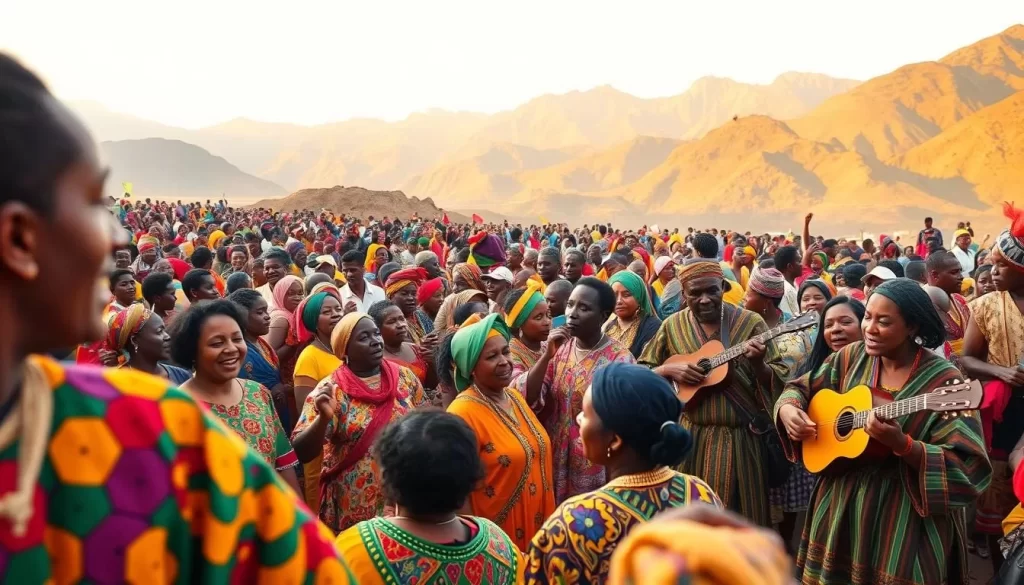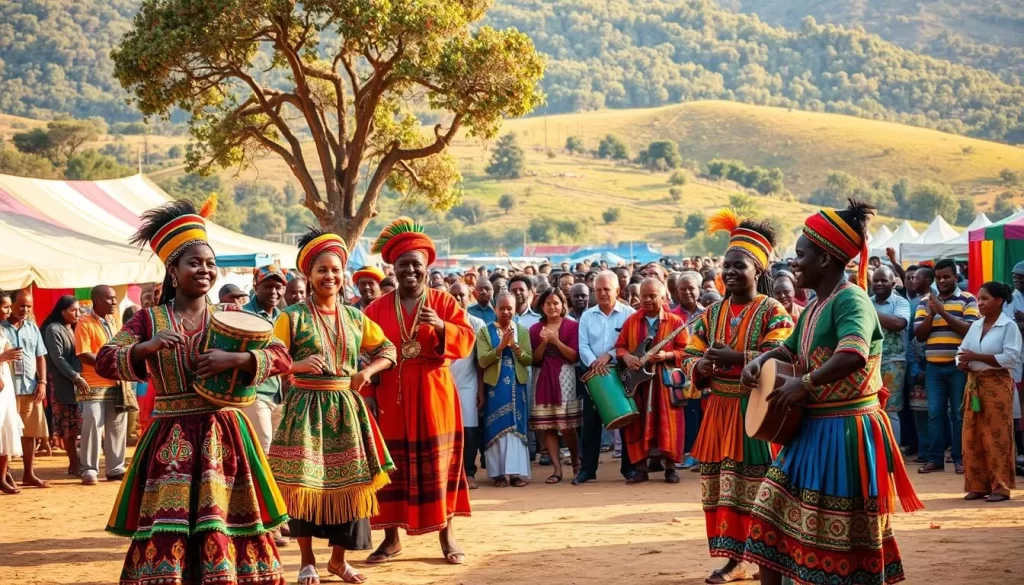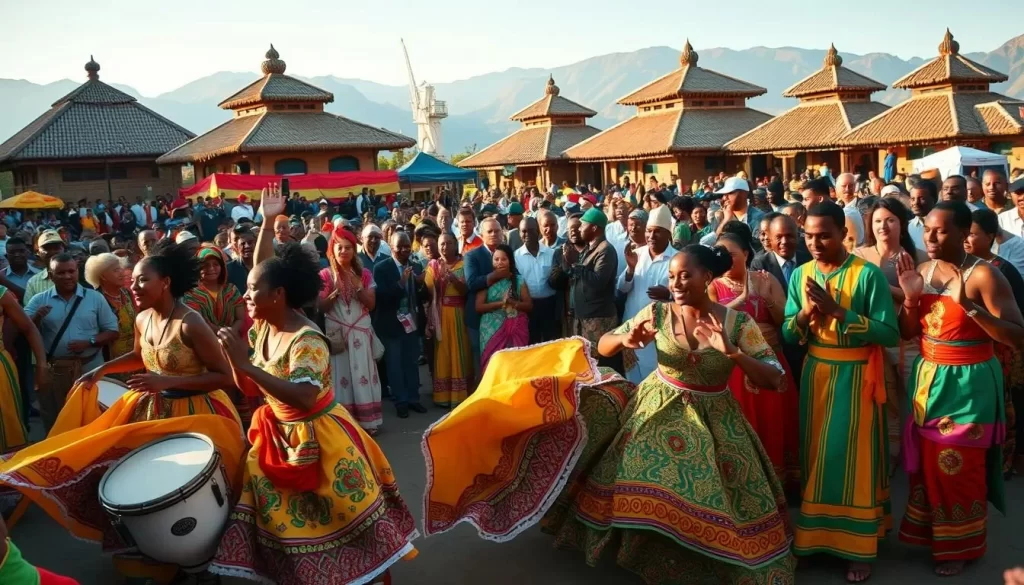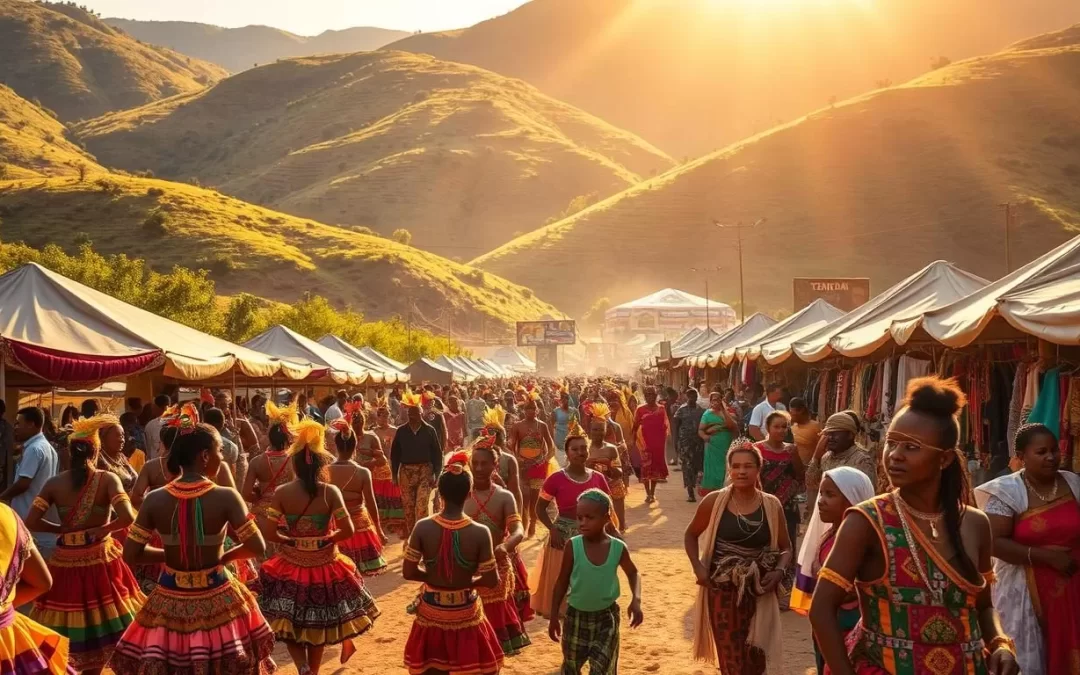Are you ready to immerse yourself in a vibrant cultural celebration that showcases a rich heritage and traditions? When you travel to this fascinating country, you’ll have the opportunity to experience its unique festivals.
The festivals in Ethiopia follow the Julian calendar, which is about 7-8 years behind the Gregorian calendar used in most of the world. This unique timing offers travelers a chance to witness authentic cultural traditions and colorful ceremonies that are steeped in history and religious significance.
By planning your travel around these festivals, you can transform a standard sightseeing trip into an immersive cultural journey. You’ll be able to connect with locals in meaningful ways and experience the country’s rich cultural heritage firsthand.
The Rich Festival Culture of Ethiopia
As you explore Ethiopia, you’ll discover a country steeped in a unique and fascinating festival culture. The country’s rich cultural heritage is reflected in its numerous celebrations throughout the year.

The Ethiopian Calendar and Its Unique Celebrations
Ethiopia follows the Julian calendar, which consists of 12 months of 30 days each and a 13th month of 5 or 6 days. This unique calendar system is the reason behind Ethiopia’s nickname, “the country with 13 months of sunshine.” The Ethiopian New Year, which falls on the date the Queen of Sheba allegedly returned to Axum after visiting King Solomon, is a significant celebration.
Why Ethiopian Festivals Are Worth Experiencing
Ethiopian festivals offer a glimpse into the country’s spiritual life and cultural identity. These celebrations, which blend Orthodox Christian traditions with ancient cultural practices, are unlike anywhere else in the world. By participating in these festivals, you’ll gain a deeper understanding of Ethiopia’s cultural heritage and experience the warmth of its people.
Winter Celebrations: Ethiopian Christmas and Epiphany
In the heart of winter, Ethiopia celebrates two of its most revered festivals, Genna and Timket, each rich in tradition and cultural significance. These festivals not only highlight the country’s deep-rooted Christian heritage but also offer a unique glimpse into its rich cultural tapestry.
Genna: Ethiopian Christmas
Genna, celebrated on January 7th, is Ethiopia’s Christmas, marking the birth of Jesus Christ. It is preceded by a 43-day fasting period called Tsome Gehad, where Orthodox Christians abstain from animal products. The Christmas Eve service is a significant event, running through the night until 9 am, filled with chanting, prayer, and candlelight, creating a mystical atmosphere in Ethiopia’s ancient churches.
Traditional Celebrations and Customs
The Genna celebration is primarily a family-oriented holiday. After the night-long service, families break their fast with traditional dishes like Doro Wat, a spicy chicken stew served with injera, sourdough flatbread. In rural areas, people still maintain the tradition of playing Yegenna Chewata, a hockey-like game believed to have been played by shepherds on the night Jesus was born.
Best Places to Experience Genna
If you’re traveling during this time, Axum and Lalibela are among the best places to experience Genna. Thousands of white-robed pilgrims gather around the rock-hewn churches, creating a spectacular scene. The vibrant atmosphere, coupled with the historical significance of these locations, makes for a truly unforgettable experience.

Timket: The Colorful Epiphany Festival
Timket, celebrated on January 19th, commemorates Jesus’s baptism and is characterized by the public display of the Tabots, replicas of the Ark of the Covenant. The festival is marked by colorful processions, including priests in embroidered robes, dancers, musicians, and crowds dressed in their finest white traditional clothing.
The Tabot Processions and Ceremonies
The ceremonial blessing of water is central to Timket. Priests bless pools or streams and sprinkle the holy water on believers, symbolizing purification and spiritual renewal. This ritual is a highlight of the festival, drawing large crowds.
Where to Witness the Best Timket Celebrations
Gondar offers one of the most spectacular Timket celebrations at Fasilides’ Bath, a 17th-century stone pool filled with water specifically for this occasion. The vibrant processions and the historical backdrop make Gondar a prime location to experience Timket.
Ethiopia: Top Festivals to Check Out When Visiting in Fall
Fall in Ethiopia brings forth a plethora of cultural celebrations, with Enkutatash and Meskel being the most notable. As the rainy season comes to an end, the country ushers in the new year and commemorates significant religious events with vibrant festivals.

Enkutatash: Ethiopian New Year
Enkutatash, celebrated on September 11, marks the beginning of the Ethiopian New Year. It is a time of renewal and celebration, coinciding with the end of the rainy season and the start of spring in Ethiopia.
The “Gift of Jewels” and Spring Celebrations
The term “Enkutatash” translates to “gift of jewels,” referencing the legend of the Queen of Sheba returning to Ethiopia with jewels after visiting King Solomon in Jerusalem. This festival is a celebration of new beginnings and is marked by children dressing in new clothes, singing, and distributing handmade paintings to neighbors, for which they receive bread or money.
How to Join the Festivities
To experience Enkutatash, you can participate in the bonfires lit on New Year’s Eve, where people sing, dance, and jump over the flames to symbolically leave the old year behind. This event is a great way to immerse yourself in Ethiopian culture and connect with the locals.
Meskel: Finding of the True Cross
Meskel, celebrated on September 27, commemorates the 4th-century discovery of the True Cross by Empress Helena. It is recognized by UNESCO as Intangible Cultural Heritage, highlighting its significance in Ethiopian culture.
The Damera Bonfire and Its Significance
The central feature of Meskel is the Damera, a massive cross-shaped bonfire that is ceremonially lit as priests chant and crowds gather around. The direction in which the Damera collapses is believed to predict the fortune of the coming year.
Experiencing Meskel in Addis Ababa
The largest Meskel celebration takes place in Addis Ababa’s Meskel Square, attracting hundreds of thousands of participants. The event is an unforgettable sensory experience, with colors, sounds, and incense creating a vibrant atmosphere.
Both Enkutatash and Meskel occur during Ethiopia’s pleasant fall season, making it an ideal time for travelers to visit and experience the country’s rich cultural heritage.
Other Notable Ethiopian Celebrations
In addition to its major festivals, Ethiopia hosts several other notable celebrations throughout the year. These events offer a unique glimpse into the country’s rich cultural heritage and provide visitors with diverse experiences.
Fasika: Ethiopian Easter
Fasika, or Ethiopian Easter, is a significant celebration that follows a 55-day fasting period. During this time, Orthodox Tewahedo Christians abstain from animal products, making the feast day particularly special. On the eve of Easter, people attend church services, bringing candles to light up the colorful ceremony. Major pilgrimage sites include Addis Ababa, Axum, Lalibela, and Gondar.
Hidar Tsion: Celebration of Mary in Axum
Hidar Tsion is a significant event in Axum, honoring Mary and connected to Ethiopian beliefs about the Ark of the Covenant. Thousands of pilgrims travel to Axum to hear priests chanting ancient hymns accompanied by traditional drums and sistrum. This celebration showcases the deep-rooted religious traditions of Ethiopia.
The Great Ethiopian Run
The Great Ethiopian Run, held in November, is Africa’s largest road race, attracting over 40,000 participants. This 10K race through Addis Ababa’s streets creates a carnival-like atmosphere, drawing both elite international runners and enthusiastic locals. Even if you’re not running, the event offers a unique way to experience contemporary Ethiopian culture.

These diverse celebrations highlight different aspects of Ethiopian culture, from deeply religious Orthodox traditions to modern sporting events. Timing your visit to coincide with one of these festivals provides an opportunity to see Ethiopia at its most vibrant and culturally expressive.
Conclusion
As you explore Ethiopia’s vibrant culture, attending one of its many festivals can be a truly enriching experience. With Ethiopian Orthodox traditions forming the backbone of many celebrations, you’ll witness living traditions that have remained largely unchanged for centuries.
From the colorful processions during Timket to the joyous community celebrations of the new year, each event offers a unique perspective on Ethiopian culture. To make the most of your travel experience, consider working with local guides who can provide cultural context and help you navigate the crowds and ceremonies respectfully.
The above is subject to change.
Check back often to TRAVEL.COM for the latest travel tips and deals.
Here are some Tours & Sightseeing suggestions that might pique your interests!
